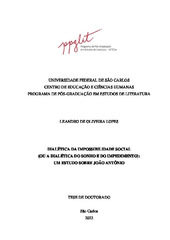| dc.contributor.author | Lopes, Leandro de Oliveira | |
| dc.date.accessioned | 2022-07-07T13:33:37Z | |
| dc.date.available | 2022-07-07T13:33:37Z | |
| dc.date.issued | 2022-06-23 | |
| dc.identifier.citation | LOPES, Leandro de Oliveira. Dialética da impossibilidade social (ou a dialética do sonho e do impedimento): um estudo sobre João Antônio. 2022. Tese (Doutorado em Estudos de Literatura) – Universidade Federal de São Carlos, São Carlos, 2022. Disponível em: https://repositorio.ufscar.br/handle/ufscar/16362. | * |
| dc.identifier.uri | https://repositorio.ufscar.br/handle/ufscar/16362 | |
| dc.description.abstract | In this study we investigate João Antônio's literature from a specific interpretation of the essay “Dialética da malandragem”, by Antonio Candido. We suggest that if, in addition to a division between poles, in which obedience to laws and customs is considered as a line that separates order and disorder, dialectics can also understand a social logic that divides the country into hierarchical classes among themselves, it will be possible to notice in his texts the literary representation of a system that naturalizes violence and impossibilities, in the mold of a country project that wants to be advantageous for the few and adverse for the many. What we are indicating - which also involves the notes of the "Dialética da marginalidade" - is a conception that starts from the point of view of João Antônio's own characters to try to understand how this specific logic of inequalities affects the texts of the author, who was notable precisely for the interpretation of the Brazilian popular classes. It is as a synthesis of this literary analysis and its probable correspondence with the concrete life of the country that we name the model as the dialectic of social impossibility. It is a proposal that begins with Candido's analytical method and is structured on the perspective of these characters to identify the mechanisms that try to define their place in the world, which meticulously seems to intend to bequeath them violence, impossibility, and abandonment. In view of this, in this study we focus on the known fictional texts by João Antônio, prioritizing those in which the popular classes are markedly addressed and in which the author privileges the figure of the malandro and his contacts with small bandits. Thus, our corpus of analysis is composed of eight short stories from the book Contos reunidos, which brings together all the author's fictional production. Our hypothesis suggests a new debate regarding the work of João Antônio, indicating that it should be seen as the literary representation of the functioning of the social structure organization that affects concrete life of people and classes in the country. | eng |
| dc.description.sponsorship | Não recebi financiamento | por |
| dc.language.iso | por | por |
| dc.publisher | Universidade Federal de São Carlos | por |
| dc.rights | Attribution-NonCommercial-NoDerivs 3.0 Brazil | * |
| dc.rights.uri | http://creativecommons.org/licenses/by-nc-nd/3.0/br/ | * |
| dc.subject | João Antônio | por |
| dc.subject | Dialética da impossibilidade social | por |
| dc.subject | Dialética da malandragem | por |
| dc.subject | Dialética da marginalidade | por |
| dc.subject | Literatura brasileira | por |
| dc.subject | Dialectic of social impossibility | eng |
| dc.subject | Brazilian literature | eng |
| dc.title | Dialética da impossibilidade social (ou a dialética do sonho e do impedimento): um estudo sobre João Antônio | por |
| dc.title.alternative | Dialectic of social impossibility (or the dream and impediment dialetic): a study about João Antônio | eng |
| dc.type | Tese | por |
| dc.contributor.advisor1 | Pellegrini, Tânia | |
| dc.contributor.advisor1Lattes | http://lattes.cnpq.br/0280434883580627 | por |
| dc.description.resumo | Neste trabalho investigamos a literatura de João Antônio a partir de uma interpretação específica do ensaio “Dialética da malandragem”, de Antonio Candido. Sugerimos que, se para além de uma divisão entre polos, em que se considera a obediência às leis e aos costumes como uma linha que separa ordem e desordem, a dialética puder também compreender uma lógica social que divide o país em classes hierarquizadas entre si, será possível notar no texto do autor paulistano a representação literária de um sistema que naturaliza violências e impossibilidades, nos moldes de um projeto de país que se quer vantajoso para poucos e adverso para muitos. O que estamos indicando, passando também pelos apontamentos da “Dialética da marginalidade”, é uma concepção que parte do ponto de vista dos próprios personagens de João Antônio para tentar compreender de que maneira essa lógica específica de desigualdades atinge e afeta os textos do autor, que se notabilizou justamente pela representação das classes populares brasileiras. É como síntese dessa análise literária e de sua provável correspondência com a vida concreta do país que nomeamos o modelo como dialética da impossibilidade social. Trata-se de uma proposta que principia no método analítico de Candido e se estrutura sobre a perspectiva desses personagens a fim de identificar os mecanismos que tentam definir o seu lugar de mundo, que meticulosamente parece intencionar legar-lhes violência, impossibilidade e abandono. Em vista disso, neste trabalho focalizamos os textos sabidamente ficcionais de João Antônio, priorizando aqueles em que as classes populares são marcadamente abordadas e nos quais o autor privilegia a figura do malandro e seus contatos com pequenos bandidos. Assim, nosso corpus de análise é composto de oito contos do livro Contos reunidos, que reúne toda a produção ficcional do autor. Nossa hipótese sugere um novo debate a respeito da obra de João Antônio, indicando que se deva enxergá-la como a representação literária do funcionamento da estrutura social que afeta a vida concreta dos sujeitos e das classes no país. | por |
| dc.publisher.initials | UFSCar | por |
| dc.publisher.program | Programa de Pós-Graduação em Estudos de Literatura - PPGLit | por |
| dc.subject.cnpq | LINGUISTICA, LETRAS E ARTES::LETRAS::LITERATURA BRASILEIRA | por |
| dc.publisher.address | Câmpus São Carlos | por |
| dc.contributor.authorlattes | http://lattes.cnpq.br/1685606169755410 | por |


